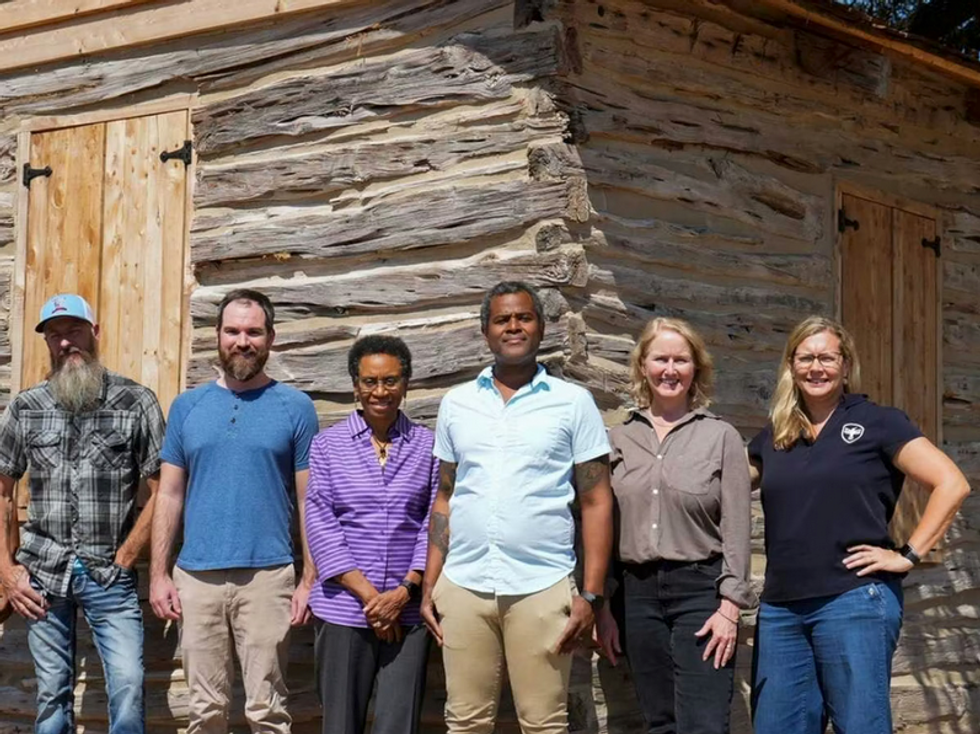Out of Bounds Comedy
Comedy from another planet: Asperger’s Are Us brings deadpan humor, autismawareness to Out of Bounds
Aug 31, 2012 | 10:44 am
Asperger’s Are Us is funny. More than funny: Hilarious.
That has to be mentioned first, because it can sometimes be obscured by the fact that the four-man sketch troupe performing at the Out of Bounds Comedy Festival is, in their words, “the first comedy troupe consisting of openly autistic people.”
More specifically, all four members of the troop have Asperger's syndrome, which is an autism spectrum disorder with its own unique characteristics such as difficulty with social interactions and a restricted range in patterns of behavior.
Members Noah Britton, New Michael Ingemi, and Jack Hanke joined CultureMap Austin by video chat from a coffee shop in the Boston area. They assured me that the fourth member, Ethan Finlan, was hiding under the table.
“I’m petting him like a dog,” Britton informed me. “He’s a good boy.”
The four members of the troupe met at an acting camp for “Aspies,” as they call themselves, where Britton was a camp counselor. When I asked their ages, Ingemi threw me into a math-related panic by answering, ”Put together, we're 86.” To my relief, they specified that Britton is 29, and the rest of the troupe members are 19.
Throughout the interview, the troupe riffed incessantly, engaged in round-robin choruses of punning, and literally wrestled with one another in a blur of tumultuous motion.
Britton, a professor of psychology, kept the conversation on track, deftly joking with the others in between impassioned remarks about autism. Ingemi interjected with gentler observations about his experience of Asperger’s. And Hanke mostly stayed out of sight behind the computer, a disembodied voice represented intermittently on screen by a giant pair of nostrils looming in front of the camera.
The troupe told me about their self-produced television pilot but were hush-hush about the details ("If you know anyone in television who would like to exploit us for our diagnosis, let us know," they said).
We also discussed their heroes, who include comedian and fake yo-yo champion Kenny “K-Strass” Strasser and Monty Python. Other names that came up—and I didn’t catch them all—included such oddballs as drag-queen musician Benjamin Smoke, Libertarian hero Irwin Schiff, and disabled erotic performance artist Frank Moore.
There were also some poop jokes.
One feature of Asperger’s is a literal-mindedness that often stymies “neurotypicals,” as Britton and Ingemi call them. When I commented on their rapid-fire punning, Britton told me that Aspies think about words more in terms of their sound and structure than their meaning, creating puns that are “really satisfying and surprising. Even though they will bug the shit out of your girlfriend.”
While some of their sketches channel the manic energy of the interview, they more often consist of precisely worded, dark, observational comedy balanced with absurd humor. Even when there is no mention of Asperger’s, sketches often play off the affectlessness associated with their diagnosis, mixing up objects and people in bizarre combinations. It’s smart, weird, deadpan humor at its best.
And, as I mentioned before, it’s hilarious.
CultureMap: Describe your comic style and sensibility, please, in 200 words or less.
Noah Britton: Well, we read a lot of Jane Austen, she's a big influence on us. On our sense and our sensibility.
New Michael Ingemi: On our pride and prejudice.
NB: Too soon!
Jack Hanke: Also our Pemberley.
NB [to Hanke]: I’m glad you're not “clueless” about this stuff.
[Hanke’s nostrils appear, close to the screen.]
NB [to Hanke]: Stop being so nosy!
CM: So what’s your sketch like?
NMI: My schedule?
CM: No, your sketch.
NB: My schedule. . . So, I wake up, I have breakfast, I use the toilet, then I cry in my closet for hours, just thinking about the pain of the whales. [Cellphone rings.] Hey, my mom's calling! [Takes out cellphone.] Hey mom. . . Um, we're doing an interview over Skype. Do you want to talk to the woman? [Holds cellphone to screen.]
Garbled Cellphone Voice: Who are you interviewing?
NB: CultureMap Austin is interviewing Asperger’s Are Us. Say hello.
GCV: Hi!
NB: Her name's Amy. She's very nice.
GCV: Hi Amy!
NB: Okay, Mom, I should probably go. I'm being rude. I'm in a restaurant, you shouldn't answer the phone in a restaurant. Okay, bye, Mom, nice to hear from you. Your joke the other day was really funny, by the way, I was really psyched about it. Bye. [Hangs up] I don't know who that was. I think it was a wrong number. . . We could talk about autism for a minute, because I know that's the only reason we're successful. So, the Original Kings of Comedy did all this stuff about being black, and that makes sense, because that's their life. And we do sketches about being autistic occasionally.
NMI: But usually in a more subtle way. Because it's not so much that the color of our skin is different, or our culture is different. It’s like our way of thinking is different. So it would be sketches that are formulated because of that. Some neurotypicals will find it funny, but unless they know about autism or are autistic or have Asperger’s, they won't really understand where the seeds of that sketch stem from.
CM: What’s different about writing comedy with Asperger’s?
NB: Having never written neurotypical comedy, I can't be certain. But a big difference is that we're not interested in connecting with the audience. A lot of comedians are under the impression that that is somehow entertaining, when in reality that's like being a friend, that's not entertaining. The things that are entertaining are the things that are objectively hilarious. Andy Kaufman is someone I'm a really big fan of, and he did everything in his power not to connect with the audience. And that's why he was so funny. Whereas someone like Ray Romano just sickens me, because he's working to connect with the audience. He’s not funny, he's an idiot. And he’s made more money than I’ll ever make in my whole lifetime. And it upsets me.
NMI: But it's not about the money.
NB: It’s about the women!
NMI: It’s about the comedy, and about the women.
NB: The other thing about autistic comedy is, we do it very deadpan. So a lot of the audience doesn't pick up on when the jokes are. They’re like, “Is it because they're retarded and they don't know what they're doing?"
NMI: They’re not quick enough. You have to be smart to understand us.
NB: Seriously. I think you have to know that we're deadpan. There are things that we fuck up. For example, we don't cheat out to the audience naturally. We’re working on this. But on the other hand, stuff like the deadpan lines . . . . people don't pick up on them because they don't realize they're supposed to be funny. They’re just like, this is really weird. And that's fine by us, because it's entertaining to us when we're writing it. By the way, we are not a troupe who is in any way trying to make fun of our diagnosis. That is not something that we think is funny. It's boring to do that stuff. We are a troupe who exists because we all have a similar sense of—Jack, she can't see what you're doing! It was funny though, he was moving the straw for like five minutes, you couldn't see it.
CM: How do you feel about being known as “the Asperger’s troupe”? You chose to name yourself after your diagnosis, but at the same time you must sometimes get tired of being known that way.
NB: Well, we pretend that isn't what's happening. It works well as a solution. We pretend like Jeremy [Sweetlamb, an OOB producer] had seen our comedy before and cared about it. When, in reality—we understand. But you know it's like, I've seen reality a thousand times and I've seen it suck 999 of them. What's that from?
NMI: Is it, is it—
NB: It’s from Benjamin Smoke, the beginning.
NMI: I was gonna guess Tyler the Creator [of Odd Future].
NB: Tyler the Creator, another of my heroes. When we were on NPR, they asked what the future looked like for us, and I said it looks “odd.” And then New Michael said, “It’s like we're a ‘Wolfgang.’” And they didn't get it, and they cut it out. That whole interview was hilarious, and they didn't get any of the jokes.
NMI: NPR are total—
NB: Not really a comedy organization. More of a liberal one. So they cared about the diagnosis more than about the comedy. But whatever. We'll use them.
NMI: They kept in the most boring possible stuff.
NB: But it was still entertaining.
NMI: It was disappointing.
NB: That’s okay. Remember, life is filled with endless disappointment.
NMI: But hold on, when they posted the article online they spelled our name wrong!
NB: Yeah! They spelled “Asperger’s” wrong! They put a "b" in it! We had to correct them. . . . We named ourselves this, honestly, without thinking about it that much. It just happened to be a very fortuitous choice. And now we're a lot more successful than anything else I've ever done for that reason.
CM: Is comedy dependent on the response from the audience? And if so, how do you deal with that?
NB: When you're autistic, it's not like other people are "real." That's true, right? [The others agree.] We're impartial observers. That’s where the metaphor of the alien comes from. Like wrongplanet.net [a forum-based autism website]. We’re aliens on this planet, we don't feel connected to other human beings. And as such, you aren't really real. So whatever you do as an audience member is kind of irrelevant. Because we're doing the sketches we like, and so every show is automatically a success.
NMI: That’s why it's so awkward to make eye contact. Because when someone's addressing you, they're acknowledging you, that you exist—
NB: They’ve reminded you that you're a human. And when you're reminded that you're a human, that's really painful and unpleasant. And that's one thing autism interventions try to do, is force us to do that, which hurts. It's physically painful.
NMI: Because we're not humans, we're animals!
JH: I think he’s exaggerating the extent of that. I mean, we can internalize the fact that this is not true, on an intellectual level.
NB: Yes. We understand it factually, even if it doesn't intuitively feel right.
NMI: We were made for a different sort of universe.
----------------------------
Asperger's Are Us will perform Saturday, Sep. 1, at 6:00 p.m. at the Scottish Rite Theater. Tickets are available through the Out of Bounds website.


 The Neill-Cochran House Museum's mid-19th-century slave quarters received Planning and Historic Designation grant support for restoration and historical interpretation.Photo courtesy of Preservation Austin
The Neill-Cochran House Museum's mid-19th-century slave quarters received Planning and Historic Designation grant support for restoration and historical interpretation.Photo courtesy of Preservation Austin Built around 1863, the Henry G. Madison cabin in Rosewood Park received Bricks and Mortar grant support for preservation planning work.Photo courtesy of Preservation Austin
Built around 1863, the Henry G. Madison cabin in Rosewood Park received Bricks and Mortar grant support for preservation planning work.Photo courtesy of Preservation Austin